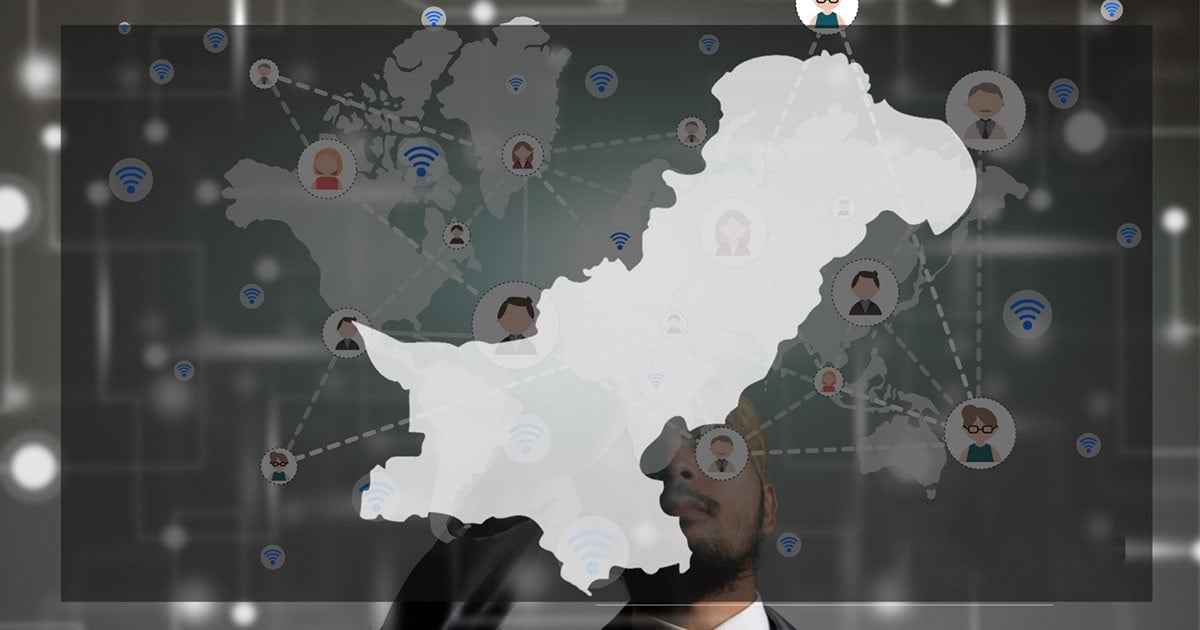GOING DIGITAL: The Challenges Faced by Pakistan

The connectivity in any country is measured through the digital transformation and the changes associated with the application of digital technology in various aspects of human society. The digital transformation is executed as a result of digitization which converts the existing products and services into digital variants. All the latest technologies, including the Internet of Things (IoT), automation, cloud computing, artificial intelligence, mobility have, a powerful impact on the social and economic conditions of the country. Going Digital is important now and countries are striving to achieve this goal.
The latest technologies increase productivity and efficiency while providing higher flexibility to carry out tasks that used to require more time being managed by manpower. All the latest technologies, including the Internet of Things (IoT), automation, cloud computing, artificial intelligence, mobility have, a powerful impact on the social and economic conditions of the country
Pakistan is pursuing aggressive IT policy with a goal of boosting Pakistan’s drive for economic modernization however, still, Pakistan coming last in these slots show that much needs to be done. . Pakistan has about 60 per cent of its 207 million population in the 1529 years age group; signifying a massive human and knowledge capital.
GOING DIGITAL: The Challenges Faced by Pakistan
There are more than 2,000 IT companies and call centres; the number is increasing every year. There are over 0.3 million English-speaking IT professionals with expertise in the current and emerging IT products and technologies. Besides that, more than 20,000 IT graduates and engineers are being produced each year.
Despite this impressive growth, Pakistan is still behind when it comes to connectivity index. According to the latest Global Connectivity index, Pakistan has fallen from its last year’s position and now ranks at 76th slot out of 79 countries. Following are a few of the reasons that have put Pakistan behind all other countries.
The gap between Technology advancement and Human Adoption Essentially, technologies are advancing rapidly, but the skills of the majority of humans are not advancing at the same speed. The gap between swiftly developing technologies and slower human development is growing bigger, and affecting the economy and the society even more. According to the federal ministry of education, the literacy rate of Pakistan as of 2019 remained 62.3%. It means 39% of the total population is still uneducated. The gap between swiftly developing technologies and slower human development is growing bigger, and affecting the economy and the society even more
Among total literate people, many women are not familiar to the latest technology and are adamant when it comes to adopting it. Many women rely on a male member of the home to get things done such as internet banking, e-commerce etc.
Lack of Trust on the Internet:
Another daunting obstacle for digital intervention is the lack of trust in the internet. Due to the increasing number of cyber-attacks and growing black market for stolen data, many people are not comfortable when it comes to using the internet. A study conducted by Comparitech has revealed that Pakistan ranks 7th among the countries having the worst cybersecurity. Due to the increasing number of cyber-attacks and growing black market for stolen data, many people are not comfortable when it comes to using the internet
Not only individuals and small business are facing cyber threats but big organizations like Careem and many banks also faced the same issue where private information of thousands of users was compromised.
Cost of Internet and Phone:
Availability of affordable smartphones and cost-effective mobile data also holds enormous importance to connect the unconnected. Due to irrational and unfair taxes imposed by the government on MNOs and OEMs, the cost of using a mobile phone is very high
However, due to irrational and unfair taxes imposed by the government on MNOs and OEMs, the cost of using a mobile phone is very high. Pakistan is the fourth country in the world with unaffordable internet. Not having a uniform internet connection is a central factor when it comes to drowning economy but also is effecting the functional democracy.
Limited Network coverage in Rural Areas:
Pakistan has a population of 219 million as of March 2020. There are 165 million cellular subscribers and 78 million broadband subscribers, which means that in this digital era, 50 million Pakistanis do not have mobile phones, whereas 141 million have not even used next-generation mobile technology. Among the total population, 37.9% of people live in cities whereas, most of the people live in rural areas. Since rural areas deprived of these services, leaving most of the population still unconnected
Since rural areas deprived of these services, leaving most of the population still unconnected.
Lack of Awareness about Online Services:
The world is transforming at a fast pace, and now people are more comfortable in adopting online services. However, Pakistanis are still struggling to use such services and are greatly relying on old means. Although social sites like Facebook, Snapchat, Tiktok are gaining popularity in Pakistan online services are not used that much.
There are very few people who use the internet to make doctors’ appointments, take online courses, book tickets or avail any other such service.
E-government services:
E-government services, especially through mobile applications, is still a relatively new phenomenon in Pakistan. The Government offices are still run through old technique or pen and paper management that is not only time-consuming but also wastes a lot of resources. Though the government is trying to incorporate e-gov services the pace is a little slow. Even people are not comfortable in adopting these latest trends.
For instance, it was announced to promote the paperless environment and all big companies like PTCL, IESCO should be sending online bills. But people were not happy about it and requested companies to provide bills on papers. Once the government offices go 100% online the digital uptake will improve.
Pakistan.
Pakistan among Countries with Most Internet Shutdown:
While covering media blackout in Kashmir, Al Jazeera revealed figures from 2016-18 listing countries with most internet shutdowns. Pakistan was second in conducting deliberate media blackouts. So, people deem the internet unpredictable hence they don’t want to rely on it. People deem internet unpredictable hence they don’t want to rely on it
Today ‘digital’ is the talk of a town. We know now that mobile is the future of everything. With the rise of the Internet of Things and mobile devices, our lives and habits have clearly changed. Everything is now connected and if it’s not, it’s about to. In order to compete with the world, Pakistan will have to step up its game sooner. We have the human capital and the basic infrastructure required to build a digital landscape, what we need is a collective partnership between all stakeholders. And if this happens, there is no stopping digital Pakistan.
We have the human capital and the basic infrastructure required to build a digital landscape, what we need is a collective partnership between all stakeholders.
Also Read: Online Education Affected due to Internet Crisis during Coronavirus Pandemic
PTA Taxes Portal
Find PTA Taxes on All Phones on a Single Page using the PhoneWorld PTA Taxes Portal
Explore NowFollow us on Google News!





